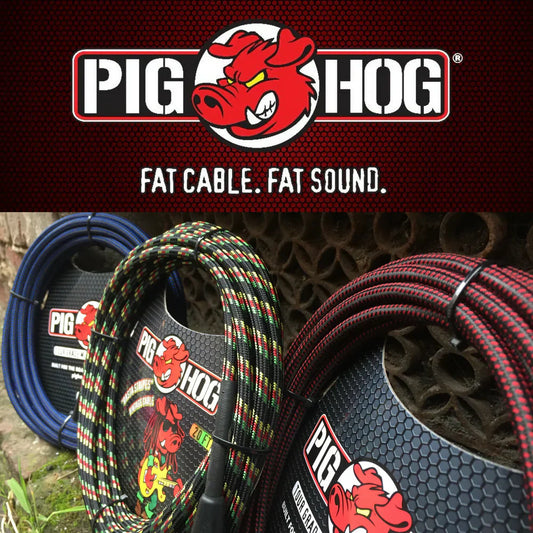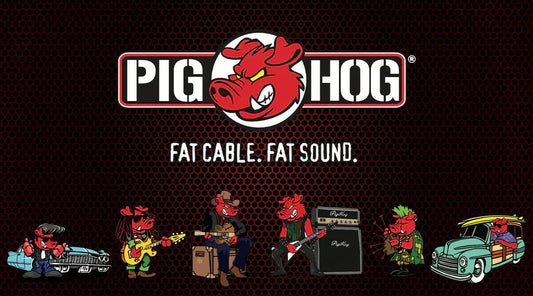If you’ve spent hours perfecting your sound, the last thing you want is a cable that cuts out mid-performance or adds unwanted noise to your signal. That’s where Pig Hog Cables come in—a brand trusted by guitarists, bassists, vocalists, and audio engineers who refuse to compromise on quality. Built to be tough, reliable, and crystal-clear in sound delivery, these cables are more than just accessories—they’re essential tools for every serious musician.
What Makes Pig Hog Cables Different?
When you’re shopping for cables, you’ll quickly notice that Pig Hog stands apart from generic, no-name options. It’s not just clever branding; their reputation comes from a combination of rugged build quality, noise-free signal transmission, and a lifetime warranty that backs up their claims.
-
Heavy-duty outer jacket: Resists kinks, tangles, and wear from touring.
-
High-grade connectors: Provide a secure fit to avoid accidental disconnects.
-
Extra shielding: Reduces electromagnetic interference for a cleaner signal.
-
Variety of types and lengths: Perfect for any musician’s setup—whether you’re wiring a pedalboard or connecting studio monitors.
Musicians across genres—from rock guitarists to jazz bassists—praise Pig Hog Cables for surviving years of live shows and studio sessions without losing sound quality.
The Role of Cable Quality in Your Sound
Many musicians focus heavily on instruments, amps, and pedals, but overlook the importance of cables. The truth is, your signal is only as good as the weakest link in your chain. A poor-quality cable can cause:
-
Tone loss: High frequencies can get dulled.
-
Noise & hum: Poor shielding picks up interference from lights and electronics.
-
Signal dropouts: Worn connectors can cause intermittent sound.
Pig Hog Cables are engineered to preserve the full tonal range of your instrument while keeping unwanted noise out. Whether you’re running a clean jazz tone or a high-gain metal rig, a solid cable ensures your sound reaches the audience exactly as you intend.
Built for Musicians on the Move
Touring life can be brutal on gear. Cables get stepped on, yanked, coiled, and tossed into cases—often multiple times a night. Pig Hog Cables are designed with the road in mind, featuring:
-
Reinforced stress points to prevent breakage at the plug.
-
Extra-thick jackets that resist damage from heavy foot traffic.
-
Tangle-resistant design so you can set up and tear down faster.
For musicians who play gigs multiple times a week, these cables are not just convenient—they’re an investment in reliability. One broken cable mid-set can ruin a performance; Pig Hog helps eliminate that risk.
Different Types of Pig Hog Cables and Their Uses
One of the best things about Pig Hog is the variety. No matter what kind of musician you are, there’s likely a cable in their lineup for your needs.
Instrument Cables
Perfect for guitar, bass, keyboards, and any direct instrument connection. Available in straight-to-straight or right-angle connectors to fit different setups.
Patch Cables
Ideal for pedalboards, allowing you to connect effects pedals without excess slack. These are short, flexible, and built to fit tight spaces.
Microphone Cables (XLR)
For vocalists, DJs, and audio engineers, Pig Hog’s XLR cables offer clean vocal transmission with minimal interference—perfect for both live and studio use.
Speaker Cables
Designed to handle high power loads between amps and speaker cabinets without signal loss.
Specialty Cables
Including Y-cables, extension cables, and adaptors for more complex setups.
By choosing the right type for each application, you ensure the best sound quality and performance reliability.
Pig Hog Cables vs. Other Brands
It’s natural to wonder if Pig Hog truly outperforms other well-known brands like Fender, Planet Waves, or Mogami. Here’s how they compare:
| Feature | Pig Hog | Fender | Planet Waves | Mogami |
|---|---|---|---|---|
| Durability | ★★★★★ | ★★★★ | ★★★★ | ★★★★★ |
| Price | ★★★★ | ★★★★ | ★★★ | ★★ |
| Sound Quality | ★★★★★ | ★★★★ | ★★★★ | ★★★★★ |
| Warranty | Lifetime | Limited | Limited | Lifetime |
While Mogami is often considered the “studio gold standard,” it comes at a higher price point. Pig Hog offers near-identical sound quality with ruggedness that touring musicians appreciate—at a more budget-friendly cost.
Real-World Performance: Studio & Stage
Musicians and engineers often put Pig Hog Cables to the test in demanding environments. Here’s what you can expect:
-
In the Studio: Minimal signal coloration, low capacitance, and consistent tone across takes.
-
On Stage: No hum or buzz, even in venues with poor electrical grounding.
-
With Pedals: Patch cables maintain clarity without adding noise to complex pedal chains.
Many performers report that after switching to Pig Hog, they’ve eliminated recurring cable issues that used to plague gigs. That peace of mind is worth its weight in gold when you’re under stage lights.
Price vs. Performance
While you can buy cheaper cables, the hidden cost comes in the form of replacements, downtime, and compromised sound. Pig Hog Cables typically cost a little more than basic entry-level cables, but their longevity and lifetime warranty make them more economical in the long run.
Think of it this way:
-
A $10 cable that breaks every 6 months will cost $40 over two years.
-
A $25 Pig Hog Cable that lasts a lifetime costs $25—once.
For working musicians, that’s a smart investment.
Why Musicians Love Pig Hog Cables
-
Consistent tone night after night
-
Handles extreme conditions—heat, cold, and constant gigging
-
Looks great on stage with signature design and colors
-
Lifetime warranty for peace of mind
-
Available worldwide for easy replacement or expansion
From blues players in small clubs to rock bands on global tours, Pig Hog Cables have become a trusted name.
Tips for Getting the Most Out of Your Pig Hog Cables
Even the toughest cables can benefit from proper care:
-
Coil them correctly using the “over-under” method to prevent kinks.
-
Avoid sharp bends near connectors.
-
Keep them clean—dust and grime can cause connector issues over time.
-
Store them in a cable bag when traveling to prevent tangling with other gear.
By treating them right, you’ll maximize their already impressive lifespan.
Where to Buy Authentic Pig Hog Cables
To ensure you’re getting the real deal—and the lifetime warranty—buy from authorized retailers. Look for trusted music stores or official online sellers. Avoid suspiciously cheap listings from unknown marketplaces, as counterfeit cables may not deliver the same performance.
You can explore our Pig Hog Cables collection in blue to see the full range, from instrument cables to XLRs and patch sets.
Every musician knows that sound is everything—and protecting that sound means investing in high-quality gear. Pig Hog Cables combine durability, tone preservation, and affordability in a way few brands can match. Whether you’re a bedroom guitarist, a touring bassist, a recording engineer, or a gigging singer, they offer a dependable connection that keeps your music sounding its best.
If you’re tired of dealing with crackling cables, signal dropouts, or hum, it’s time to upgrade. Check out our best-selling Pig Hog Cables in blue and experience the difference for yourself.



